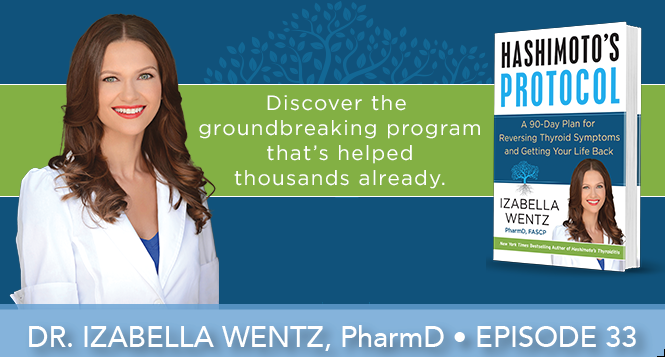Episode 33 | Dr. Izabella Wentz | The Thyroid Secret

CLICK PLAY!
FAMILIAR WITH PODCASTS? LISTEN ON iTUNES!
Follow Along With The Transcript!
Kathy Smith: Izabella, welcome to the show today. I’m excited to have you.
Izabella Wentz: Kathy, I’m so excited to be here with you. I’m a huge fan of your work. I have quite a few of your workout videos, and it’s just such an honor to be here with you.
Kathy Smith: Well, great. I have a story for you. About 20 years ago, I was experiencing this extreme tiredness that went beyond just needing to get a good night’s sleep. I was feeling drained, I was feeling moody, really mismotivation here. I didn’t really even have the motivation sometimes to finish some of my projects.
It became difficult because, at that point, I was on a book tour. Imagine that. I was traveling around the country, I was lecturing, I was doing TV promotions and I was exhausted. I was feeling really, really rotten.
At that time, I was fortunate to have an M.D. who practiced functional medicine, and he recognized my symptoms and the possibility of my having Hashimoto’s Disease, which I did. That started my journey for trying to understand this tiny, yet such a powerful gland, the thyroid gland. Let me just ask you. Is my story common or uncommon?
Izabella Wentz: Oh, my goodness. It’s so very common. We have 27% of the population in the United States that has Hashimoto’s. I know it sounds really, really exotic, but it’s the leading cause of hypothyroidism and having an underactive thyroid. If you’ve been told you have a sluggish thyroid, that you need thyroid medications, this is an indication that you have Hashimoto’s.
For most women, it takes an average of 10 years before they’re diagnosed, and they’re struggling with fatigue, sometimes with depression, sometimes with weight gain, oftentimes with hair loss. For every man that’s diagnosed, five to eight women will be diagnosed with the conditions.
Kathy Smith: Yeah, I’m telling you. If you have it, it’s not fun. It really just takes all the zip out of your personality and out of your entire world. Now, how did you get so interested in the thyroid in the first place?
Izabella Wentz: It’s kind of funny, because when I was going through pharmacy school, I was never really interested in the thyroid gland. I was never interested in nutrition. I was eating Hot Pockets for breakfast and eating McDonald’s for lunch and so on and so forth. It wasn’t until a few years after I graduated from pharmacy school when I was diagnosed with Hashimoto’s after almost a decade of some pretty confusing and debilitating symptoms.
I had chronic fatigue. I was sleeping for 12, sometimes 15 hours a night to feel rested. Even when I was awake, I was still feeling brain fogged. I was having panic attacks, I was having anxiety, pain in my body, acid reflux, irritable bowel syndrome. It really felt like my body was breaking itself apart and falling apart. Year after year, I kept having more and more symptoms. This was when I was a pretty young woman. I was still in my 20s.
I would go to different doctors and ask to have testing done. They said, “Everything is normal,” “We think it’s in your head,” or “You’re just stressed out,” or “Maybe you’re getting older and maybe that’s why your memory’s not as good as it used to be,” which of course, is ridiculous because I was in my mid-20s at the time.
After that point, once I got the diagnosis, I knew that I could take thyroid hormones and I did. They were somewhat helpful, but at the same time, I knew that there was something else going on with my body. Hashimoto’s is an attack on the thyroid gland, and it’s your immune system attacking you. It’s not necessarily a foreign invader. It’s your own body that’s attacking you.
Kathy Smith: Why does your body start attacking your thyroid gland? What would trigger that?
Izabella Wentz: The way that I’ve identified it is there’s about six different types of root causes. They’re are going to be food sensitivities, nutrient deficiencies, toxins, chronic low grade infections, a leaky gut and an impaired stress response. So, any of these six things could set off an autoimmune attack on the body.
It’s basically a case of mistaken identity where the immune system gets confused because of these factors and starts attacking the thyroid glands. What all of these things sort of have in common is that whenever we don’t have enough nutrients on board or we’re eating foods that are inflammatory to us that we’re sensitive to or we have toxins in the body, that sends a message to our body that we’re not safe in our environments.
One of the things that can help us survive in an unsafe environment is slowing down our thyroid function. The fastest way to do this is to launch an attack on the thyroid gland. So, we’ll see that with survivors of famines and survivors of wars. They usually have low thyroid function, because their metabolism has been slowed down, and their motivation levels that have been slowed are going to be protected in times of a famine or a war because you’re more likely to hide in your cave or somewhere than be out in the world and get yourself into trouble.
So, really, it’s sort of a case of mismatched genes for our environment where we have our ancient genes in today’s environment. One of the big things I always talk to women about is what is it in your day-to-day life that’s sending your thyroid gland and your body a message that you’re not safe here. This is how we re-establish the body starting to once again recognize that the thyroid is a part of our body and it’s not something to attack.
Kathy Smith: That’s interesting because years ago, I remember we’d recommend, obviously, eating good food and the right portions and getting exercise on a regular basis.
Then there was a group of people that were doing seemingly all the right things – right portions, they were eating what they considered the right foods and exercising on a regular basis and, yet, they couldn’t lose weight. That’s when the thyroid started to be discussed, like maybe you’re low on thyroid.
Probably some of the things that some people would do were really triggering this response including a lot of deprivation, like going on crazy diets where you deprive yourself of a lot of calories and a lot of nutrients and you’re suggesting that maybe even can be triggering some of the thyroid response?
Izabella Wentz: Yes, absolutely. There’s a variety of different things that can trigger this autoimmune response when you think about any kind of stress on the body. Stress on the body is going to be not getting enough food. So, whenever we’re dieting and we’re eating these low calories, that sends a signal to our body that we don’t have enough food around. Why else would you not be eating? In a way, our body tries to protect us by slowing down our metabolism and it’s kind of saying, “Hey, I’m going to help you survive. I’m going to slow things down.”
And you’re like, “No. I’m trying to diet.” Again, it’s a miscommunication between our ancient genes and our current environment, because cavemen would never go on diets on purpose. With extreme exercise, if we’re doing a lot of extreme exercise that is not right for our bodies–some people can tolerate a lot more exercise. They’re healthier, their stress responses, some genetic predispositions. For others, if you’re on a treadmill all day every day and you’re not feeding yourself correctly, that could actually send the wrong signals to your body, making it want to slow you down, and it thinks that you’re being chased by a bear because [overlapping speech 00:11:22]
Kathy Smith: Why else would you be running all day long? But it’s true. What I’ve noticed is that with every year you get a little older, every year that you’re on this planet, I notice that I have to shift my exercise. Because things that I could do in endurance sports that I could do when I was in my 20s and 30s, it’s not that I can’t do them anymore, it’s just that I don’t feel great the next day, let’s say. I can still get out there, but I don’t feel great the next day.
That’s just reminding me that I can still get out and do endurance sports, but now I have to balance it with my yoga, with my rejuvenation type exercises if I don’t want to create this stress response, which I have in my life. Listen, I have the personality, I’m a go-getter, I love to just participate in everything and, yet, it’s the balance that I found in my life that helped me regain this ability to manage my thyroid. I think that’s what’s so brilliant about your book is that you get into how do you rebalance the body so that you have optimal thyroid function.
You focus on three main areas, and I love one of the places where you start is with liver and really making sure you have good liver support. You mention that liver support is much different than doing liver detoxes.
So, could we talk about why liver is so important and especially this time of year. Is there something we should be doing to detoxify our liver and, then, support our liver?
Izabella Wentz: That’s such a great question and it’s so important to stay in balance of course. That balance might change as the seasons change, as we get older, as we have more stress in our lives, when we have children. What I found with people with Hashimoto’s is there are going to be three different body systems that are going to be impaired: the liver, the adrenals and the gut.
The liver is especially important. What’s happening in Hashimoto’s is we have, basically, a backlog of toxins. We know that our liver is our primary detoxification organ. When the liver doesn’t work as well as it should, we end up with way too many toxins recirculating within our bodies and not getting out properly. Now, the reason why people with thyroid disease are going to be at risk is because: one, they’re gut, which is another source of getting rid of toxins is always going to be leaky, so that’s going to be shunting all these extra toxins onto the liver and two, because they’re not sweating enough.
Most people with an underactive thyroid have problems where even with exercise, they’re not going to break a sweat. This is not something that many people complain about. They’re kind of like, “Huh, I’m not sweating,” and mostly they don’t want to change it. They should want to change it because sweating is a very healthy way to get rid of toxins.
The liver support I recommend is you’re boosting your body’s own ways of detoxification so you’re supporting the liver and you’re supporting sweating to clear out some of those toxins. It’s different than doing something like a forceful detox, like chelation therapy or what-not, because that actually can be difficult on the body and that can force a whole bunch of toxins to get detached from wherever they’re stored in the body and start recirculating. If those detox pathways – the liver, the gut and the skin – are not working properly, we’re going to get this toxic backlog just recirculating and potentially getting stored in different parts of the body that are going to be potentially worse to be stored in. So, the toxins may leave the thyroid, but they may get lodged in the brain or somewhere else which can be quite scary.
So, part of the liver support is really about taking care of those low-hanging fruit. Removing the daily toxins in your life such as fluoride from your water supply and the disrupting chemicals from your personal care routine as well giving your body an opportunity to heal so we’re giving liver-supporting foods and nutrients, and we’re also taking away some foods. Starting these daily habits like doing hot baths or doing a sauna or hot yoga are ways where you can start clearing out some of that toxic backlog. The exciting thing is the majority of people – about 80% of the people who do this two-week protocol with thyroid disease actually feel significantly better within the first or second week of going through this liver support protocol.
Kathy Smith: So, supporting the liver can actually kick-start the whole healing then and start to make you feel better after even a few weeks, which is interesting. I think any of us who have gone down this journey of trying to understand the thyroid, as well as other parts of the body, have tried things through the years. Of course, I’ve been in the business for so long, and I get a kick out of experimenting with new technologies and safe new techniques.
One of the things that I did maybe about 10 years ago was a three-week sauna. It was sort of what you’re talking about. It was niacin. It was some exercise that got you sweating a little bit and then there were saunas. As I went through this program over three weeks, the clearing that happened in my body – the alertness–I took tests before and after the protocol and my memory, my focus, even my eyesight, you could hear, you could smell – all these amazing things that seem to clear up.
I enjoyed the process, but it’s interesting what you just said. I’ve also tried to do something like this at other times in my life and I felt horrible. It hasn’t worked. So, it’s an interesting approach and I like what you’re talking about that instead of doing something that many times puts too much stress on the body, that you take care of it on a regular basis, as you said with food. Let’s talk about what are the support vitamins or minerals or any nutraceutical you might take for liver support.
Izabella Wentz: Sure. Is it ok if I cover food as well? Because that’s something that people can do in their own homes too.
Kathy Smith: Yes.
Izabella Wentz: Hot lemon water is a really great food or, I guess, beverage to help kick-start the liver support. Doing green smoothies with lots of veggies and fruit. Beats are an excellent detoxifying food. Cruciferous vegetables, cilantro, turmeric and dairies, these are some of the best foods that you can incorporate in your day-to-day diet to help get rid of some of the toxins and have them moving along.
As far as the supplements that I utilize, I really love to use some methylation support, helping people methylate properly. Methylation is a way that the liver detoxifies heavy metals and other kinds of toxins that we may have. About 50% of the population doesn’t methylate properly. So, I do some methylation support where we do supplements that contain activated folate versions, B12 as methyl cobalamin. This is taken for about two weeks if somebody has normal methylation. If they have sluggish methylation, if they have MTHFR mutation, they might take this for long-term. I like to use amino acid containing supplements that support phase two liver detox.
The liver has two different phases of detoxification. Phase one changes the toxins into a different form so that they can be properly eliminated through phase two. The problem is when we have too much phase one [unclear 00:20:16], the metabolites can actually be more toxic than the original products. So, phase two is really, really crucial to properly support, because if you just support the one phase of detox, we can end up with all of these intermediates.
So, phase two, I like to recommend glutamine, lysine, taurine, alpha ketoglutarate, glutathione, methionine. This is something that can be taken as a supplement. I really like the amino detox one from Designs for Health that has a combination of these different types of amino acids that support phase two liver detox.
Then, there’s also taking herbs and nutrients and glandulars that support the liver. One of them is going to be milk thistle. Taurine is an excellent one that helps us actually detoxify fluoride from our body which is a really big thyroid toxin, as well as ox bile which helps us clear out a lot of the fat-soluble toxins. I also like N-acetyl cysteine and curcumin which is a type of turmeric. Then another part of this is magnesium.
This sounds like a lot of stuff.
Kathy Smith: It does.
Izabella Wentz: The good thing is it’s only done for two weeks, and also a lot of the nutrients and ingredients that I named can be found in one type of powder. Designs for Health has a powder and I also have one from my brand, Rootcology, the liver reset powder. It has the majority of those ingredients that you can just take a scoop of that and put that in a smoothie.
Kathy Smith: We’ll have all of this in the liner notes. You covered this also in your book, Hashimoto’s Protocol. So, if the listeners missed any of those ingredients, they can look for them in your book.
I know that for myself, the whole thing with thyroid, when I was in a place where I was feeling so, so tired and feeling, as I said, foggy and unfocused and a little depressed, it’s hard to know where to start. Where should you start looking? What should you start doing? What should a person do if they have any inkling that this might be something that’s going on with them? Are there tests they should take? Should they reach out to certain doctors? What would be their first step?
Izabella Wentz: It’s good to know what you’re dealing with, so getting the proper tests is really, really important. The challenge is if you go to a traditional, conventional medicine doctor, they will run a test for thyroid function that’s known as the TSH test. This test is really, really helpful for advanced cases of thyroid disease. If you have Hashimoto’s for more than 10/15 years, this test will be elevated and it’ll show that your thyroid gland is destroyed to the point that it could no longer produce enough thyroid hormone.
The challenge is, for the first 10 years that a person has Hashimoto’s, this TSH test may be normal. So, you also need to ask the doctor to do antibody tests. The antibody tests let us know whether an immune system attack on the thyroid gland is happening or not. These are thyroid peroxidase antibodies – TPO – and then, thyroglobulin antibodies – TG.
These two lab tests are going to be elevated and indicate there’s an attack on the thyroid gland for 10 to 15 years before the traditional medical tests uncover this attack on the thyroid glands. I can’t tell you how many times I’ve seen that women will present all these thyroid symptoms and their doctor will unfortunately will only run the TSH test and it’ll be normal.
Hashimoto’s has five stages, and the TSH doesn’t really get changed or elevated to the point where conventional doctors would discover it until stage four. We start seeing symptoms in stage two. We’ll start seeing symptoms and antibodies in stage two of Hashimoto’s. So, this is really, really important.
As far as the doctor, I find that a lot of times, going to a functional medicine doctor, a naturopathic doctor or integrative doctor, you’re going to get more comprehensive care than you would from a primary care doctor or even an endocrinologist if you have thyroid disease.
Kathy Smith: The key is, it sounds like, that you want to be prepared. You want to know the information so you’ll kind of know what questions to ask, so when you go in, depending on what your doctor says, you can perhaps take it to the next step. On top of that, finding the right doctor’s obviously the most important thing.
I’ve been blessed through the years, because I had amazing doctors who have really worked with me. We talk about a relationship and it is a collaboration. I come in, we talk about what’s going on in my life, I tell them what I’m feeling. It’s almost like a little bit of a detective process.
I’m sure when you were going through your whole issues in your 20s, it was you have to look at this – is it the adrenals? Is it the thyroid? Is it liver function? What is it and how do you start painting the picture of your particular body? Because all of us are so unique. I would even imagine even with Hashimoto’s, it manifests itself differently in each individual.
Izabella Wentz: Yes, absolutely. There’s different types of symptoms that people can have and one person, their biggest challenge might their weight. Another person might have normal or average weight or may even be losing weight, but they might be struggling with fatigue. Another person may be struggling with depression because of Hashimoto’s. These are all symptoms that something is out of balance in your body and that you need to work towards finding balance.
In Hashimoto’s Protocol, I go through a fundamental protocol that is supporting the liver, adrenals and gut. In working with over a thousand clients with Hashimoto’s over the last few years, I found that about 80% of people will get significantly better even if they’ve been working with doctors and struggling with symptoms for more than a decade when they follow these protocols. It’s the liver, adrenals and gut, and there’s also various types of root causes. I say that every Hashimoto’s patient is like a snowflake, because they’re going to have a different combination of what triggered their condition.
Different things can set off a sense of unsafety within the body. For one woman, it might be breast implants. Breast implants can be recognized by the body as a toxin. Some women will start having Hashimoto’s and autoimmunity symptoms after having breast implants put in.
Other women, they might have a food poisoning incident, and the food poisoning incident might set off the autoimmune cascade in their bodies and cause their thyroid gland to be under attack.
For another subset of women, it might be a viral infection in the thyroid gland such as Epstein-Barr virus, the virus that causes mono. Then, this gets stuck in the thyroid glands. In the immune system, there’s an autoimmune theory known as the bystander effect. The immune system tries to get rid of the virus and attacks the surrounding thyroid tissue.
In Hashimoto’s Protocol, I have the fundamental protocols that everybody should do, regardless of their root cause, that are going to be focused on building up the body and making it stronger. The advanced protocols have some quizzes and assessments to help people dial in to what was their root cause. Then, we have advanced protocols to help address each root cause.
For example, for Epstein-Barr virus, you know that if you had a mystery illness and you never felt quite the same after or if you’ve had a case of mono, then likely, that’s your root cause. If you have sinus issues, then potentially mold can be a root cause for you. If you know that your symptoms started after breast implant surgery, then the breast implants could be a potential root cause for you.
Different people might have just one root cause. Other people might have multiple root causes that they need to address. It’s kind of like peeling back layers of an onion.
Kathy Smith: Interesting. One of the things that you emphasize over and over again is that in your protocol, healing your gut becomes a big focus. We talk about that a lot on the show, but I don’t know if it can be even over stated how important having a healthy gut is. Tell us how it relates to the thyroid.
Izabella Wentz: This is such an important point. The thing that not many people know is that gut cells and thyroid cells have the same futile origin. Many times, the state of your gut will determine the state of your thyroid.
Research is showing that every case of autoimmune disease has three components: genetic predisposition, a trigger and intestinal permeability or a leaky gut. We can’t change our genes just yet, and we can’t always know what the trigger is. That, sometimes, can be elusive to figure out what triggered the condition, but we can always address the health of the gut. The cool thing is if you just take away one of those things, the condition can go into remission.
So, one of the big focuses is focusing on gut health, and trying to get the gut in balance is going to be helpful for most people with thyroid disease. How we do that is we do address food sensitivities, we address enzyme deficiencies, nutrient deficiencies, imbalance of gut bacteria and also look at potential infections within the gut, such as small intestinal bacterial overgrowth, H. pylori, which is a stomach infection and even potentially parasites that could be living inside of the gut. These can be potential problems that can cause us to have a leaky gut.
When we get that dialed in, we can go into remission. So, this is a really, really big focus of my work and what I always recommend for people with Hashimoto’s to do.
Kathy Smith: Ok. I know we have to wrap up here, but I do want to just touch on, for a second, the adrenals and how they impact the thyroid. Because I know when I was going through my episode and was first diagnosed, I was under a lot of stress. I was burning the candle at both ends. I was having some relationship issues. I was probably over exercising at the time. So, there was a lot of stress in my life, and I do believe that having a TV show, getting up at 4:30 in the morning, going, going, going really was part of what triggered everything in my body. How does stress and the adrenals affect the thyroid?
Izabella Wentz: I’m sorry that you went through that. That is something that a lot of us are not aware of. We can be go-getters and we’re helping the world, which you were helping and healing the world, but at the same time, your own body was suffering. If we’re burning the bridge at both ends, this doesn’t give our body the opportunity to be in that rest, digest and heal state. This is what happens in people who have too much stress in their lives.
Now the stress could be something that happened in the past. We know that women and men who are survivors of sexual or physical abuse that occurred during childhood are going to have higher levels of thyroid disease and autoimmune disease as they get older in life.
Then, we also know that people who tend to burn the candle at both ends, people who are nightshift workers, people who have sleep apnea are basically sleep deprived and under a lot of stress. They’re also going to have higher rates of thyroid disease.
When we go back to the whole adaptive physiology and safety theory, it makes a lot of sense because all of these occurrences, they send messages to our body that we’re not safe and that we need to conserve resources, we need to conserve energy. That eventually leads to the body to try to slow us down. I think, for me, as a type A, and a lot of us women with Hashimoto’s, we’re amazing achievers, right. But it really is a way for your body communicating and saying, “Hey, we need to slow things down a bit.”
I found in working with clients and surveying my readers, the biggest thing that makes people feel worse, 95% of them with Hashimoto’s, is a lack of sleep. Another big thing is being stressed out. Ninety-three percent of people say that makes them significantly feel worse. Then, being around negative people, fighting with loved ones are some other things that make people feel significantly worse.
The way that we rebalance that is through extreme self-care and self-love and self-compassion where we give ourselves an opportunity to sleep. So, rather than going against our body and saying, “You’re tired. I’m going to give you caffeine, and I’m going to keep you awake all night.” Like, “You’re tired. Ok, I’m going to listen to you. You’re telling me that you’re tired. I’m actually going to go to sleep.”
So, the adrenal recovery protocol is a month-long protocol which I like to call [unclear 00:35:24], where you really just baby yourself and take care of yourself, you make sure you’re getting plenty of sleep, you’re eating really good foods frequently throughout the day, you’re destressing so you have permission to say no to everything. You’re rebalancing your blood sugar because that can also be a big stressor on the body. Then, you’re also replenishing different nutrients and adaptogens. Again, these send that safety signal back to the body to let you know that, “Ok, things are good. We’ve got things under control. The stress is not getting to me. I’m not being chased by lions and tigers and bears.”
Kathy Smith: No, just your kids. If you liked what we talked about today, you’re going to love Izabella’s book called Hashimoto’s Protocol. You have to check it out. Right on the cover, it says, “It’s a 90-day plan for reversing thyroid symptoms and getting your life back.”
When you look at Izabella, she is just a shining example. She beams with energy and vitality and health. It’s really going to be worth your time to pick up the book. Even if you have a boatload of energy and aren’t suffering from any of the symptoms we talked about today, I guarantee you there’s somebody in your life that this information can have a huge impact on. It’s a life changer for so many people out there. As you talked about in the beginning of the show, one in five now are suffering either from Hashimoto’s or some other thyroid issue.
So, pick up the book. It’s life changing. As I said, if you don’t have an issue with it, then pass it on to one of your best friends. They will forever be indebted to you.
I also want to thank you, everybody out there, for listening. If you’re enjoying what you’re hearing, you’ve got to do me a favor and go to iTunes and just give a little bit of feedback, maybe a review or tell me what you want to hear about in the next episode. I love hearing from all of you guys.
Izabella, once again, what can I say? You’re a rock star. It was so nice to have you on the show.
Izabella Wentz: Kathy, thank you so much for having me. It was such a pleasure and such an honor to be here with you. Let’s heal some thyroids together.
Kathy Smith: I love it. Let’s do it. Our mission. I’ll join you on your mission. Anyway, lots of love.
Izabella Wentz: Likewise. Thank you so much.









